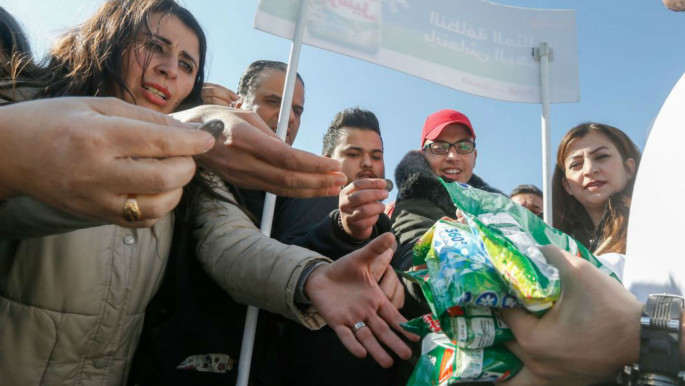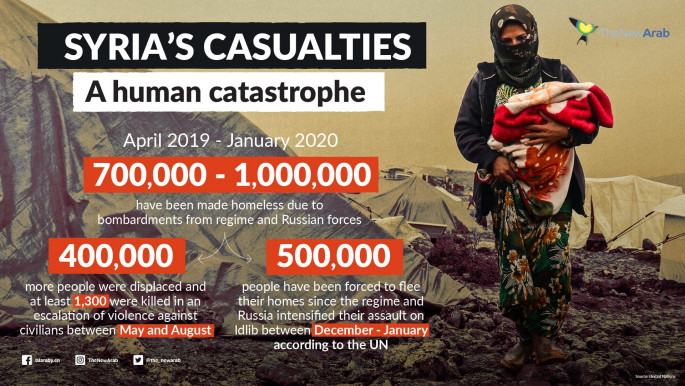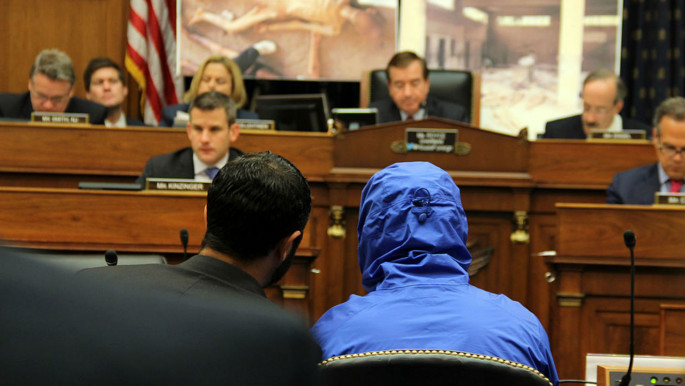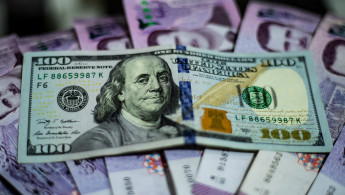As Syria's economy collapses, how much more can people bear?
As usual with Shaaban's speeches, Syrians' reaction was one of disbelief.
With the Syrian economy in an unprecedented nose-dive, even while Shaaban made this claim, and the value of the Syrian pound reaching 1,000 to one US dollar, all but Assad's super-rich elite are struggling to meet their most basic daily needs, not just in areas controlled by the Syrian regime and its Iranian militia allies, but nationwide.
Even before Shaaban's ill-conceived claims, the worsening economic conditions, among other factors, had already led to widespread discontent even in traditionally regime loyalist areas.
In the majority-Druze province of Suweida in south Syria, local people held demonstrations condemning the regime's corruption and incompetence with banners bearing slogans like 'We Want to Live' and 'The Syrian Media is Fake'.
 |
|
| Read also: Syria Weekly: Hard economic times test the patience of Assad loyalists |
The economic crisis has further increased the already heavy burden on Syrians still suffering from the consequences of the war that has spanned nine years to date.
The regime has effectively bankrupted the country to maintain power. Many of those who survived the relentless bombing by Syrian, Russian and Iranian air and ground forces that reduced whole villages, towns and city neighbourhoods to rubble, now have no choice but to return to their destroyed areas.
They have to accept the regime's 'security agreements' and try to start afresh amid the ruins of their homes, with no sign of hope, improvement or freedom on the horizon.
"It's been outlawed for people to even carry any dollars in their pockets, so how should someone try to exchange it in an open manner?!" Mahmoud Al-Ahmad*, the owner of a currency exchange bureau in the city of Damascus, told The New Arab.
 |
It's been outlawed for people to even carry any dollars in their pockets |  |
"This is due to Bashar al-Assad's decree banning foreign exchange trading – those who do so face security prosecution, possibly imprisonment or heavy fines. This issue wasn't considered important [by the regime] previously with no decree banning it but with the issuance of the decree, it became impossible.
"We exchange dollars in a private way, not according to the exchange rate from the Central Bank, but rather according to the market price; if the price of one dollar in the central bank is 700 Syrian pounds, and in the market 1,000 pounds, we exchange it at 950 or 900 Syrian pounds," Al-Ahmad added.
Read also: Syrian pound continues to plunge to new lows, rattling Assad regime
Asked about the reason for the decline in the exchange rate of the Syrian pound against the dollar, he said, "There are many hidden reasons. It seems to me that Russia and Iran have reduced their foreign exchange support for Syria – what is certain is that the movement in Lebanon is a major reason.
"The Syrian merchants were bringing foreign currency, especially dollars, from the banks of Lebanon, and with these banks lacking cash liquidity, merchants could no longer take their money from there. There is no doubt that the Caesar Act sowed fear in the hearts of merchants and regime supporters, which prevented them from dealing in cash in Syria."
 |
|
| Read also: 'Anyone seen our father?' Family of jailed American in Syria seek help from former detainees |
Although the accelerating pace of events in neighbouring Lebanon constitutes one of the causes of the financial meltdown in Syria – due to the closure of the Lebanese banks used by Assad's regime to transfer money from abroad in order to avoid the sanctions imposed on it – the Syrian regime itself bears the greatest responsibility for this deterioration in economic conditions and in every other aspect of life.
It is difficult for non-Syrians to conceive the endemic corruption at every level within the Syrian state, where the regime's government and all state institutions work solely under the orders of the security services overseen by Assad and backed by Iran and Russia.
Read also: Banking in Lebanon is not paying off for Damascus
The sole concern of Assad and his backers and, therefore, of all state bodies, is restoring absolute control over Syria's land and people, who are treated, in effect, as chattels to be subjugated through terror, intimidation and silencing of any dissent.
Corruption is, thus, an innate part of a system based on exploitation and self-enrichment, with this culture of impunity at every level affecting all aspects of life, further increasing the economic hardships for the vast majority.
Among the worst affected are the hundreds of thousands of Syrian women who have been left widowed or whose husbands are imprisoned or 'disappeared' by the regime for participating in the revolution.
 |
Among the worst affected are the hundreds of thousands of Syrian women who have been left widowed or whose husbands are imprisoned or 'disappeared' by the regime for participating in the revolution |  |
With no family breadwinner and with young children to raise, these women have been forced to find any work, usually in menial, low-paid jobs due to the lack of employment opportunities.
Samar B*, a resident of Damascus whose husband was detained by the regime some years ago, now lives with her two children, her mother, and her sister.
"The [monthly] salary that I earn from the government job is $60 after the last increase, and my sister's salary from her job is about $50," she tells The New Arab.
"The rent for the house we live in isn't high compared to other homes, and is around $60 per month. The cost of living for us is about $100 per month, while the bills are $20.
"I work for 13 hours a day so I can support my family. I think that the deteriorating economic conditions are due to several reasons, the first of which is that the regime has gone bankrupt after it sold the country to foreigners. Also, oil returns aren't used for our benefit, and the ports were sold to Russia. Eastern Ghouta was a major source of currency for the regime, but the state treasury has been depleted for years to come," she adds.
"I don't think that the situation is going to improve; on the contrary, it's in an accelerating deterioration. But I am happy because the supporters of the murderous regime are also starving today."
However as much as the situation deteriorates, it's unlikely that the people in Damascus will break their silence or protest in the near future. The situation in Damascus is very different to that in Suweida, which has largely been spared the bombardment, arrests and siege endured for years in Damascus.
In the traditionally loyal Syrian coastal areas, where a majority still supports the Syrian regime, the situation is a little different.
 |
|
Ahmad. N* is a resident of the city of Latakia, where he runs a shop. "Things are worse here than before," he tells The New Arab.
"My wife and son were forced to work in order to be able to keep us afloat financially. With the rise in prices due to the fall in the price of the Syrian pound compared to the dollar, not everyone is able to secure their needs, or even buy basics.
"Even supporters of the regime, despite Bashar al-Assad's ruling preventing the circulation of the dollar under penalty of punishment, people are still dealing in it more than before, due to the instability of the lira price.
"Everyone is pessimistic about what will come. The continuation of the war and its cost, the state's failure to assume its responsibilities towards the citizens, and the widespread corruption, in addition to the security services' control of everything, has made our area a treacherous forest that's very difficult to live in. We see death coming to us, and there is nothing we can do!"
It is no secret to anyone that the Syrian economy began to crumble since the US president signed the Caesar Syria Civilian Protection Act in late December last year.
Also known as the Caesar Act, it is a United States legislation that sanctions the Syrian regime, including Bashar al-Assad, for war crimes against the Syrian population. However, the bill has not been passed into law yet.
 |
|
| Read also: Syria Weekly: Caesar Act to become law, with tough sanctions on Assad's torture enablers |
But even without the Caesar Act, the dire conditions for most Syrians would not have improved.
The Syrian regime's monopolising and exhausting of all the state's resources to fund its war against its own the people, and the selling or giving away most of these resources to its backers in Russia and Iran to pay for their support, was the final straw for an economy already buckling under the decades-long damage by the Assad regime.
The war has effectively compounded the existing status quo, wiping out the already precarious middle class, leaving two classes in Syria – the Assad's and their small wealthy elite of family and beneficiaries, and the crushed majority.
For the Assad's, as always, every solution to the problems besetting the nation lies in punishing and extorting this already crushed majority further. Instead of proposing solutions to renovate, rebuild and improve the nation, based on study, research, analysis and a positive vision of Syria's future, the regime is intent on further persecuting the people.
While the Syrian people are still, as always, expected to endlessly suffer, fight and/or die to protect this status quo, to accept foreign occupation and 'ownership' of their nation, and to view imprisonment torture and 'disappearance' as the natural price of any dissent, the regime elite continues to live in extravagant luxury with a fortune of hundreds of millions of dollars plundered from the Syrian people deposited in offshore accounts around the world.
 |
For Assad's inner circle, the terrible suffering of the majority of Syrians is a faraway inconvenience that doesn't affect their lives any more than those of any wealthy American or Russian |  |
For Assad's inner circle, the terrible suffering of the majority of Syrians is a faraway inconvenience that doesn't affect their lives any more than those of any wealthy American or Russian. Assad's children and those of his elite will live in luxury in grace-and-favour homes in Russia, while ordinary Syrians die.
We don't yet know whether the collapsing Syrian economy, the worthless currency and atrocious living conditions will push Syrians to rise up again against the regime and its bloodthirsty sponsors, or if the regime will perhaps try to win international favour by abandoning its war against the people after the Caesar Act goes into effect.
But after reducing a nation to rubble and ashes, selling its resources to foreign states, killing or dispossessing over half its population and leaving the survivors in penury in order to cling to power, one thing is near certain, Assad's morally and fiscally bankrupt regime is living on borrowed time.
*False names have been used to protect the identity of those who face persecution for any condemnation of the regime
Dani Qappani has worked as a media and human rights activist in Syria since the beginning of the popular uprising in March 2011 in his hometown, Moadamiyeh city, west of Damascus city. He lived under-siege imposed by the Syrian regime and affiliated militias between 2012 and 2016, before being displaced with his family to the north of Syria.
He is a survivor of the August 2013 chemical attack and a large number of other attacks and massacres in his city at the time. He is now based in the Gaziantep province in Turkey.
Follow him on Twitter: @Dani_Qappani



